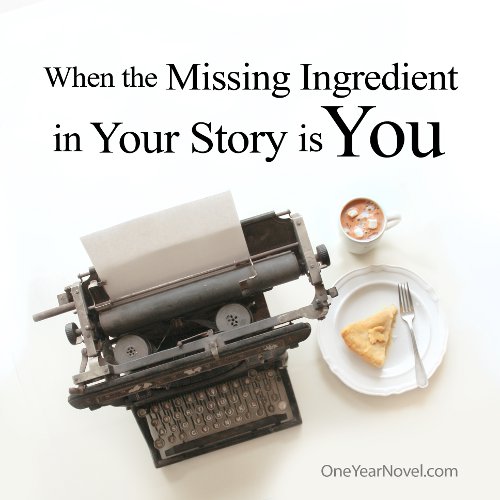When the Missing Ingredient in Your Story Is You
Guest post by Miguel Flores
 Few things we learn about writing are consistently applicable to every writer. One of those rare things is this: writing is hard.
Few things we learn about writing are consistently applicable to every writer. One of those rare things is this: writing is hard.
To combat this struggle, many writers rely on this thing called inspiration. With this building block, writers claim the ability to instantaneously leap into brand new worlds or push past the final week of NaNo. Unfortunately, however, Lady Inspiration can be fickle. Her usefulness is limited and, if you’re not careful, you’ll easily fall into the I-only-write-when-I’m-inspired trap. (This can just as easily be translated into “I get inspired precisely two hours before the deadline of anything I need to do.”)
There are many other excuses, but this is a frequent one. It’s so frequent, in fact, that many beginning writers will fail to finish their first project. Simply because of this seemingly unsurmountable learning curve.
Let’s be honest. There are days we all excuse ourselves with “I wasn’t inspired to write today.” The common remedy is to do something to get your adrenalin running or to kick your imagination back into shape. The list includes lots of great (and sometimes weird or extreme or overused) ideas like watching a movie, cleaning the dishes, climbing a tree, or punching a wall—with your face.
Again, writing is very, very hard. I don’t mean that ironically. I don’t mean that metaphorically. Writing’s just hard. That’s it—that’s basically the point of this entire article. You want your prose to become so enjoyable that readers won’t ever trip over the grammar during their adventure? To make your readers’ experience easy and enjoyable, you’d better be ready to put a lot of tough and miserable work into your craft.
Or as Jack London put it, “You can’t wait for inspiration. You have to go after it with a club.”
Best piece of advice when you’re stuck? Shut yourself up and just do it.
Seriously, though. If writing’s so hard, why do we do it? Maya Angelou says, “A bird doesn’t sing because it has an answer, it sings because it has a song.” What’s your song?
That’s the harder part, really: finding the song. It gets harder? Yes, it does. There’s more to writing than just hard work—not to mention talent + practice + reading. Obviously, it’s entirely possible to produce good writing with those variables in the equation, but you know what makes your writing really great?—what completes the equation?
Pretty simple: “There is nothing to writing. All you do is sit down at a typewriter and bleed” (Ernest Hemingway).
It’s not enough to sweat your gross, salty body leakage onto pages. You have to give up something that’s precious to you, something that’s really part of you, from deep inside. Why? Because really, really great writing hurts.
To put it another way, every story—no matter what medium you’re using to tell it (a book or a song or everyday living) is a bit like a recipe. You put it together with some sort of base (plot), a memorable ingredient (character), a little spice (conflict), a typical taste that everyone’s used to or addicted to (admit it; you have clichés in your writing too), and top it with garnish to make it look pretty (style). Oh, and the whole recipe should probably work together (theme). (Ice cream and pizza might be awesome ideas on their own, but they taste pretty horrid when they’re thrown together.)
Food is meant to be enjoyed. Scarfed down if you’re starving, digested slowly if you want to savor it. Food, for some, isn’t any good if there’s no taste; for others it has to have a sense of hominess . Books should “taste like your mother’s cooking.” But it will only ever be just a “recipe” if that’s all you’re going to put into it. It can still be a perfectly good recipe, but it’s not really yours. For all we know, a reader could be asking for Tolkien’s Stew but getting generic Fantasy Land’s Soup instead. What’s the ingredient you’ve got to put in to make it distinctly yours?
Hint: it’s spelled Y-O-U.
In order to get your story out, you’re going to need to put more than work into it. You’re going to burn your hands on the wrong pans sometimes and it might take year of cuts before you ever learn how to properly handle a knife (I’m talking about adverbs here). But don’t worry; it took Tolkien twelve years to perfect his recipe.
You should never give up, though. It’s worth it. Besides, “There is no greater agony than bearing an untold story inside you” (Angelou).
Writing is considered by many to be a sort of freeing escape from the world, but for many dedicated writers, it’s also a form of voluntary slavery. Putting that much of yourself into a story—dedicating not just time and energy, but your very thoughts and emotions and self to a story—is exhausting. Some days, you wonder what the point of it all is. After all, when you put so much of yourself into a something you create, you are vulnerable, naked to a watching world; there are bound to be repercussions.
That’s why you don’t write to the world. Write to people, to a person.
Somewhere out there are people who are bleeding too; show them your scars. Somewhere there’s a girl without a home; provide her one with your poetry. Somewhere out there is a boy ready to end it all; give him a reason to start living again.
This is why you need to bleed into your words. People can tell when you’re lying, so don’t. Don’t write a generic soup. Make it your own. Write from your own story. That’s the power you have. Besides, you may be the author, but you’re the reader as well. No one absolutely needs your story more than you do.
Good writing should make you sweat, but great writing will make you bleed. How far will you go?
 About Miguel
About Miguel
Miguel Flores has been a member of The One Year Adventure Novel community long enough to be considered an “oldie.” He enjoys answering story questions with reference to deceased writers and food (click here if you like showdowns and burritos). Once he finishes his B.S. in Business Information Management, he plans to start up a writing consultation business. When he’s not busy working or studying, this Floridian poet spends his days with a cup of tea in his hand, a cat in his face, and a lot of ink on his fingers.


